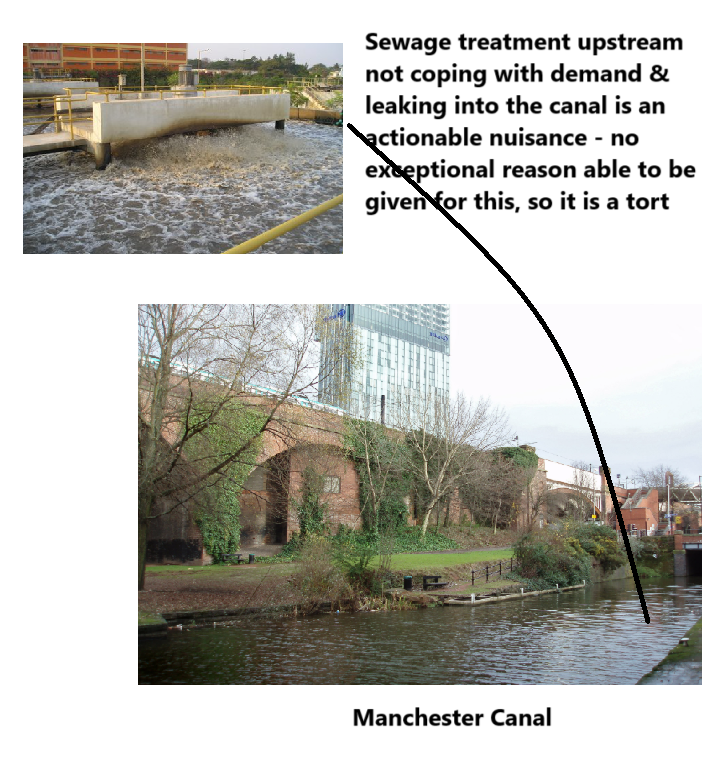The Manchester Ship Canal Company Ltd v United Utilities Water Ltd No 2 [2024] UKSC 22 (02 July 2024)
Citation:The Manchester Ship Canal Company Ltd v United Utilities Water Ltd No 2 [2024] UKSC 22 (02 July 2024)
Rule of thumb:If a person’s sewage floats into your private waters, do you have a right of action against them over this? Yes, this is an actionable nuisance which requires an exceptionally good reason to defend (like an Act of God Vis Major) – this case did not provide this so the overflow of sewage into the land was actionable.
Background facts:The basic facts were that United Utilities had a system for filtering & treating sewage. This system did not have the capacity to treat all the sewar water so this overflowed without treatment, some of which ended up in the Manchester canal land. United Utilities argued that they were acting in accordance with statute & that the infrastructure was not able to cope with the excessive demand, albeit there were no extraordinary weather circumstances which caused this (it was just infrastructure that was outdated).
Court held: The Court held that the lack of infrastructure & no breach of statute was an insufficient defences of this, and that this was indeed a private nuisance. The water companies cannot allow untreated sewage to float into another person’s private land & if it does then it is liable for this in a nuisance action.

Ratio-decidendi:
‘United Utilities is responsible for discharges of noxious effluent into watercourses from its sewers, sewage treatment works and associated works which occur as a result of its sewerage system operating as it is designed to do when its hydraulic capacity is exceeded. United Utilities points to the fact that the connection of more homes to the sewerage system leads to the system being overloaded and results in more effluent being discharged into the canal more frequently. But that is not what gives rise to the cause of action in nuisance. If the discharges constitute a trespass (a matter on which we express no view), United Utilities is the body responsible for the commission of that tort. If the discharges constitute a nuisance, that is something which United Utilities has caused or adopted, since its sewerage system is designed in a way that deliberately involves the discharge of effluent into the canal when the hydraulic capacity of the system is exceeded. Its liability does not depend on the application of the Sedleigh-Denfield principle, ie on establishing that it has failed to take reasonable steps to prevent a hazard on its land from causing a nuisance. Unless the commission of the tort has been authorised by Parliament, or common law rights of action have been excluded, the Canal Company therefore has a cause of action. As we have explained, the 1991 Act does not authorise the commission of such a tort; and it does not exclude a common law right of action’.
Lord Reed at 136
Warning: This is not professional legal advice. This is not professional legal education advice. Please obtain professional guidance before embarking on any legal course of action. This is just an interpretation of a Judgment by persons of legal insight & varying levels of legal specialism, experience & expertise. Please read the Judgment yourself and form your own interpretation of it with professional assistance.

